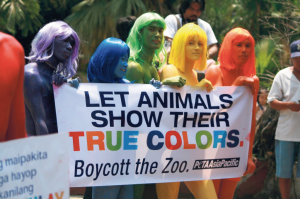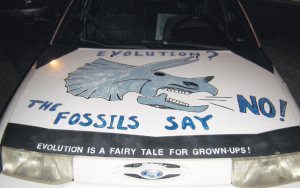WEDNESDAY, 3 OCTOBER 2012
Anti-intellectualism has been a constant thread winding its way through our political and cultural life, nurtured by the false notion that democracy means that ‘my ignorance is just as good as your knowledge’ – Isaac AsimovOver the past century, science has achieved more than at any other point in history. From splitting the atom to the invention of smartphones, scientific discovery and innovation have shaped the world around us. But in an age in which anyone can publish their opinion through comment sections, Twitter and blogs, we are constantly assaulted with a barrage of often incorrect and uninformed opinions. From governments, who cherry-pick evidence to suit their manifestos, to religions which deliberately suppress scientific teaching, our collective ignorance is being targeted by minorities to bend public policy to their will, often with detrimental consequences.
Earlier this year, it emerged that almost all airlines and ferry operators visiting the UK have ceased to carry animals destined for research. At the root of this issue lie People for the Ethical Treatment of Animals (PETA), a UK-based charity dedicated to promoting and protecting animal rights. Their interference could have disastrous effects on medical research. Rather than entering into public discourse about the necessity of using animals in research, PETA have taken an aggressive approach to target transport companies directly and intimidate them into action. Moreover, they focus on individual cases of animals being harmed to canvass support, denying that many of today’s lifesaving drugs and treatments would not exist without animal experiments. However, blocking transport routes is unlikely to shut down this research altogether. Instead, it may drive it to countries where animal husbandry and experimentation regulations are not as tight as those imposed in the UK. Our struggling economy may be robbed of some of its scientific talent and industry revenue as researchers follow the animals abroad. Effectively, many animals may suffer more as a result of PETA’s interference.
In a similar fashion, several ‘green’ groups, including Greenpeace and Friends of the Earth, have played on the public’s perception of nuclear power in order to shut down power plants and abandon projects for new ones. Their views are generally based on grossly overstated claims of the effects of the Chernobyl nuclear disaster and are bolstered by the media frenzy surrounding last year’s meltdown at the Fukushima nuclear power plant in Japan. Whether nuclear power is always the best power source is a debate for another time, however, the outcome of this intervention has not been a move towards greener power sources. Nuclear power plants have been switched off with no clean alternatives in place and as a result, the use of fossil fuels has increased. Under the guise of protecting the planet from the energy they have decided is dangerous, these supposedly green groups may have inadvertently contributed significantly to carbon emissions.
Perhaps more alarming are the reports of groups, who would deny future generations the opportunity to learn about their world. The battle of evolution vs. creationism that has long been waged in the US, has now taken centre stage in South Korea, home to a burgeoning research and biotechnology industry. A recent petition by the Society for Textbook Revise is aiming to remove all traces of the ‘erroneous’ theory of evolution from textbooks, exploiting debates over the origin of some species as evidence that the theory is wrong. The campaign has had surprising success and many publishers have revealed their intentions to produce revised copies of their textbooks, excluding particular examples of evolution.
Another assault on education comes from The Texas Republican Party, who recently stated their opposition for any sex education other than abstinence until marriage. While this is hardly a new story in the US, research has repeatedly demonstrated that this approach doesn’t work. The lack of education in alternative methods of contraception drove rates of teenage pregnancy and sexually transmitted diseases skyward over the course of the Bush administration, even though millions of dollars had been ploughed into the teaching of abstinence. It serves as a powerful reminder of what can be achieved by a few, who place their beliefs above scientific evidence and above the lives of millions of people.
The media have a considerable role to play in facilitating the actions of these groups as they provide a public platform for many of them. The BBC’s science coverage came under fire last year following criticism that it gave too much weight to minority arguments and opinions. While trying to fulfil their remit of presenting a balanced and impartial account of the news, the BBC was accused of unintentionally generating controversy. Neither are we as scientists without blame. We often choose to hide in the safety of our labs to avoid facing societal issues or engaging with the public in an open dialogue that could prevent science from being exploited for the gain of a few.
Thankfully, it seems that there is light at the end of the tunnel for scientific policy. The likes of Brian Cox have done wonders to raise the profile of science and to dispel the view of scientists as white coat-wearing, bearded eccentrics. Ben Goldacre, a doctor and author of the Bad Science newspaper column and book, has been an advocate for good science reporting in the popular press. He has helped to explain how research is conducted and to debunk the many adverts that assault us with impressive-sounding, but scientifically meaningless, claims.
However, many scientists and communicators, including Goldacre, have been sued for libel by large corporations, against which they have spoken in their effort to protect the public from the false scientific claims of their products and practices. In many cases our libel laws have allowed businesses to quash scientific debate and silence critics. The Libel Reform Campaign has recently raised this issue, with the aim of persuading the UK government to amend libel laws to protect free speech and scientific discussion. Meanwhile, in the health and education sectors, celebrity chef Jamie Oliver’s long standing campaign to get good, healthy food into school canteens has had some success through raising public awareness and lobbying MPs. In Korea, an outcry from evolutionary scientists has led their Ministry of Education to pledge to set up an expert panel to oversee future amendments to scientific textbooks.
These examples of the exploitation of science are not isolated, neither are the intentions of such minority groups always bad, though their means can be questionable. But policy shouldn’t be down to the opinions of a few to fuel personal gain. It should be the result of careful consideration of the issues at hand and the evidence that surrounds them. There is great need for more openness and discussion to prevent the misrepresentation of evidence, and of science as a whole. There is also a need for more effort from the public to engage and question, rather than to merely accept information and be misled. Science is a discipline that invites controversy and opinion. But because our world is irrevocably dependent on it to function, good science should be at the centre of policy.
Vicki Moignard is a 2nd year PhD student in the Department of Haematology




